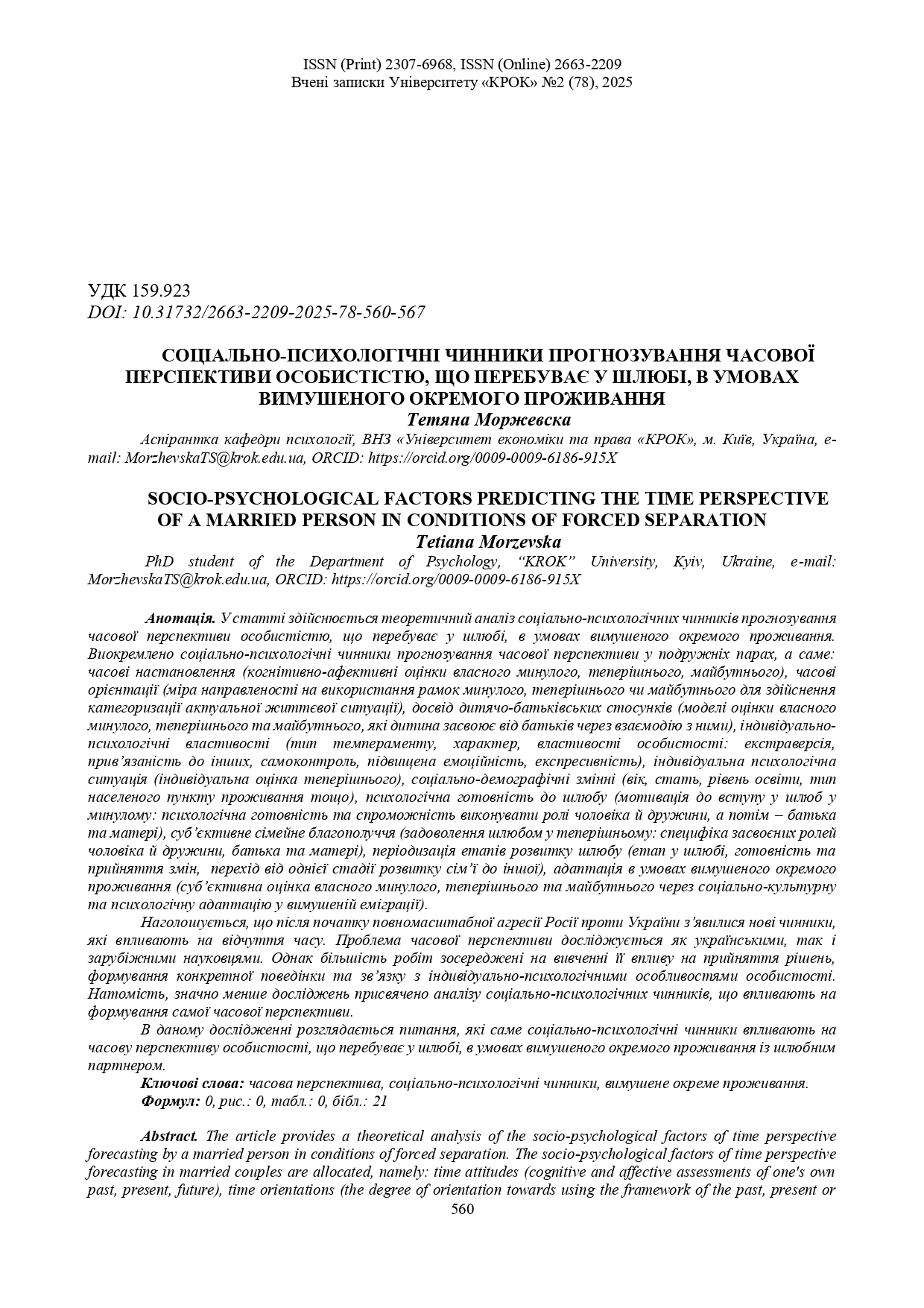SOCIO-PSYCHOLOGICAL FACTORS PREDICTING THE TIME PERSPECTIVE OF A MARRIED PERSON IN CONDITIONS OF FORCED SEPARATION
DOI:
https://doi.org/10.31732/2663-2209-2025-78-560-567Keywords:
time perspective, socio-psychological factors, conditions of forced separationAbstract
The article provides a theoretical analysis of the socio-psychological factors of time perspective forecasting by a married person in conditions of forced separation. The socio-psychological factors of time perspective forecasting in married couples are allocated, namely: time attitudes (cognitive and affective assessments of one's own past, present, future), time orientations (the degree of orientation towards using the framework of the past, present or future to categorise the current life situation), experience of child-parental relationships (models of assessment of one's own past, present and future that a child learns from parents through interaction with them), individual psychological properties (type of temperament, character, personality traits: extraversion, attachment to others, self-control, increased emotionality, expressiveness), individual psychological situation (individual assessment of the present), demographic variables (demographic characteristics, country and type of settlement: childhood residence, residence after marriage, forced emigration), psychological readiness for marriage (motivation for marriage in the past: psychological readiness and ability to perform the roles of husband and wife, and then - father and mother), subjective family well-being (satisfaction with marriage in the present: specificity of the roles of husband and wife, father and mother), periodisation of the stages of marriage development (according to V. Satyr: a stage in marriage and tasks for overcoming the corresponding crisis, readiness and acceptance of changes, transition from one stage of family development to another, including the past, present and future of the family), adaptation in conditions of forced separation (subjective assessment of one's own past, present and future through socio-cultural and psychological adaptation in forced emigration).
It is emphasised that after the beginning of Russia's full-scale aggression against Ukraine, new factors have emerged that affect the sense of time. The problem of time perspective is studied by both Ukrainian and foreign scholars. However, most studies focus on its impact on decision-making, the formation of specific behaviour and its connection with individual psychological characteristics. Instead, much less research is devoted to the analysis of socio-psychological factors that influence the formation of the time perspective itself.
The present study examines the question of what socio-psychological factors influence the time perspective of a married person in conditions of forced separation from his or her marriage partner.
Downloads
References
Васильченко О., & Бацман, Є. (2022). Образ Я і уявлення про майбутнє у молоді. Вчені записки Університету "КРОК", 3(67), 147–152. doi: 10.31732/2663-2209-2022-67-147-152.
Дідковська, Л. І., & Дідковський, А. П. (2023). Психологія потенційного емігранта. Львів: Растр-7.
Дідковська, Л. І. (2023). Ставлення до еміграції та ціннісні орієнтації особистості. Журнал сучасної психології, 1(28), 51–59. doi: 10.26661/2310-4368/2023-1-6.
Котлова, Л. О. (2014). Сімейні труднощі на різних етапах життєвого циклу сім’ї. Видавничий центр Європейської асоціації педагогів і психологів «Наука», Прага [Publishing Center of the European Association of pedagogues and psychologists “Science”, Prague], 2. 176–182.
Максименко, С. Д. (2017). Теорія вищої нервової діяльності І. П. Павлова. Проблеми сучасної психології, 38. 7–17.
Сеник, О. М. (2016). Соціально-психологічні чинники уявлень студентської молоді про часову перспективу. (Кандидатська дисертація). Львівський національний університет імені Івана Франка. Доступ через URL: https://ispp.org.ua/2020/05/06/senik-o-m-socialno-psixologichni-chinniki-uyavlen-studentsko%D1%97-molodi-pro-chasovu-perspektivu/.
Сингаївська, І. В., & Страмоусова, І. Є. (2024). Чинники життєстійкості жінок під час війни. Вчені записки Університету «КРОК», 3(75), 231–245. doi: 10.31732/2663-2209-2024-75-231-245.
Склярова, Г. О. (2024). Аналіз практики використання термінів “прихильність” та “прив`язаність” у науковій психологічній літературі. Вчені записки Університету «КРОК», 1(73), 254–259. doi: 10.31732/2663-2209-2024-73-254-259.
Слюсаревський, М. М., & Блинова, О. Є. (2013). Психологія міграції. Кіровоград: ТОВ «Імекс ЛТД».
Федоренко, Р. П. (2015). Психологія сім’ї : навч. посіб. Луцьк: Вежа-Друк.
Alea, N., & Bluck, S. (2003). Why are you telling me that? A conceptual model of the social function of autobiographical memory. Memory, 11, 165–178.
Baumeister, R., & Leary, M. (1995). The need to belong: Desire for interpersonal attachments as a fundamental human motivation. Psychological Bulletin,17(3), 497–529.
Gonzaga, G., & Campos, B., & Bradbury, T. (2007). Similarity, convergence, and relationship satisfaction in dating and married couples. Journal of Personality and Social Psychology, 93(1), 34–38.
Jamieson, L. (1998). Intimacy: Personal Needs in Modern Societies. Cambridge: Policy Press.
Ptacek, J. T., & Dodge, K. L. (1995). Coping strategies and relationship satisfaction in couples. Personality and Social Psychology Bulletin, 21(1), 76–84.
Rusbult, C. (1980). Commitment and satisfaction in romantic associations: A test of the investment model. Journal of Experimental Social Psychology, 16(2), 172–186.
Satir, V. M. (1967). Conjoint Family Therapy. Palo Alto, CA: Science and Behavior Books.
Stolarski, M., Postek, S., & Smieja, M. (2011). Emotional intelligence and conflict resolution strategies in romantic heterosexual couples. Studia Psychologiczne [Psychological Studies], 49(5), 65–76.
Stolarski, M., Wojtkowska, K., & Kwiecin´ska, M. (2015). Time for love: Partners’ time perspectives predict relationship satisfaction in romantic heterosexual couples. Article in Time & Society. doi: 10.1177/0961463X15596703.
Stolarski, M., Wiberg, B., & Osin, E. (2014). Assessing Temporal Harmony: The Issue of a Balanced Time Perspective. Time perspective theory; Review, research and application: Essays in honor of Philip G. Zimbardo, 57–71. Springer International Publishing/Springer Nature. doi: 10.1007/978-3-319-07368-2_3.
Zimbardo, P. G., & Boyd, J. N. (1999). Putting time in perspective: a valid, reliable individual-differences metric. Journal of personality and social psychology, 77, 1271–1288.

Downloads
Published
How to Cite
Issue
Section
License

This work is licensed under a Creative Commons Attribution-NonCommercial 4.0 International License.

